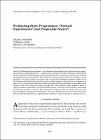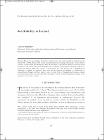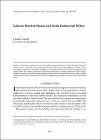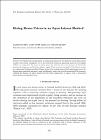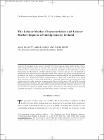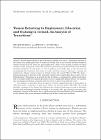Browsing Economic and Social Review Archive: Complete Collection 1969- by Subject "Labour market"
Now showing items 1-19 of 19
-
Academic salary differentials - some evidence from an Irish survey
(Economic & Social StudiesDublin, 1990)Using data from a survey of the Irish academic labour market, this paper examines whether or not females in the Irish academic system are paid less than comparable males. Variables which adjust for comparability include ... -
Aggregate job creation, job destruction and job turnover in the Irish manufacturing sector
(Economic & Social StudiesDublin, 1998)Using an annual employment survey data set we construct aggregate job flow rates for the Irish manufacturing sector for the period 1974 to 1994. We report the existence of simultaneous job creation and job destruction, ... -
Aspects of the labour market for new graduates in Ireland: 1982-1997
(Economic & Social StudiesDublin, 1999)Using a survey on the first destinations of award recipients in higher education from 1982 to 1997, the trend in first destinations and starting salaries for primary level graduates in Ireland is studied. The data show ... -
Costs of exchange rate volatility for labour markets: empirical evidence from the CEE economies
(Economic & Social StudiesDublin, 2003)According to the traditional `optimum currency area? approach, little will be lost from a very hard peg to a currency union if there is little reason for using the exchange rate in response to economic shocks. This paper ... -
Evaluating state programmes: ?natural experiments? and propensity scores
(Economic & Social StudiesDublin, 2000)Evaluations of programmes ? for example, labour market interventions such as employment schemes and training courses ? usually involve comparison of the performance of a treatment group (recipients of the programme) with ... -
Job mobility in Ireland
(Economic & Social StudiesDublin, 2009)This paper investigates the factors that determine job-to-job mobility in Ireland over the period 1995 to 2001. It finds that labour market experience, working in the public sector, whether a person is overskilled, the ... -
Labour market rents and Irish industrial policy
(Economic & Social StudiesDublin, 1999)This paper examines the issue of whether harmonising taxes across the traded and nontraded sectors is desirable. Preferential treatment for the traded sector might be justified if either the output response of subsidies ... -
Labour market rigidities, institutional impediments and managerial constraints: Some reflections on the recent experience of macro-political bargaining in Ireland
(Economic & Social StudiesDublin, 1996)It has become almost an accepted axiom within contemporary political science that macro-political forms of bargaining are in irreversible decline. Such institutionalised forms of bargaining are now perceived as inflexible ... -
Language and occupational status: linguistic elitism in the Irish labour market
(Economic & Social StudiesDublin, 2009)This paper, using data from the 2006 Irish Census, provides evidence of the structural advantage of Irish speaking, relative to non-speaking workers in Ireland?s labour market with advantage and disadvantage being defined ... -
Married women in the Irish part-time labour market
(Economic & Social StudiesDublin, 1998)This paper uses an econometric analysis of the 1987 Economic and Social Research Institute household survey data to assess the sources of the growth which has occurred in parttime employment in the last decade. The models ... -
Migration and the option value of waiting
(Economic & Social StudiesDublin, 1995)Migration is an investment: it involves fixed, unrecoverable costs and uncertain future returns. If migration can be postponed, the option value of doing so may have positive value. Migration may not occur for a range of ... -
Real wage convergence in an open labour market
(Economic & Social StudiesDublin, 1996)This paper looks at how the Irish experience of integration has affected the labour market, bringing about convergence in labour costs between Ireland and the UK. A model of this process is developed and estimated which ... -
Rising house prices in an open labour market
(Economic & Social StudiesDublin, 2005)We explore the consequences of rising house prices for the openness of the Irish labour market. Since many immigrants are in the household formation age group, and tend to be highly skilled, we argue that the boom in house ... -
Segmented labour markets and earnings in Ireland
(Economic & Social StudiesDublin, 1997)Segmented labour market theory rests on two central tenets. The first is that it is meaningful to distinguish between primary labour markets providing "good" jobs with high wages and stable employment and secondary labour ... -
The causes of Ireland's unemployment
(Economic & Social StudiesDublin, 1990)We outline a small model of the Irish labour market and use it to explain what has happened over the last 10 years. We conclude that Irish unemployment problems in the 1980s were due to international demand-side factors, ... -
The incidence of male non-employment in Ireland
(Economic & Social StudiesDublin, 1996)This paper presents an analysis of male economic activity ? employment, unemployment and non-participation using micro data from the 1993 Labour Force Survey. The main characteristics that contribute to bad labour market ... -
The labour market characteristics and labour market impacts of immigrants in Ireland
(Economic & Social StudiesDublin, 2006)The purpose of this paper is twofold. We first produce a labour market profile of non- Irish immigrants who arrived in Ireland in the ten years to 2003. We then go on to use the labour market profile in estimating the ... -
What has happened to replacement rates?
(Economic & Social StudiesDublin, 1996)This paper compares different approaches to measuring changes in replacement rates in Ireland over time. Results based on microsimulation modelling suggest that the average replacement rate facing unemployed persons was ... -
Women returning to employment, education and training in Ireland: an analysis of transitions
(Economic & Social StudiesDublin, 2004)Recent improvements in the Irish labour market have led to a substantial increase in the labour force participation rate of women in Ireland. Part of this increase has been fuelled by women moving from the home into paid ...








